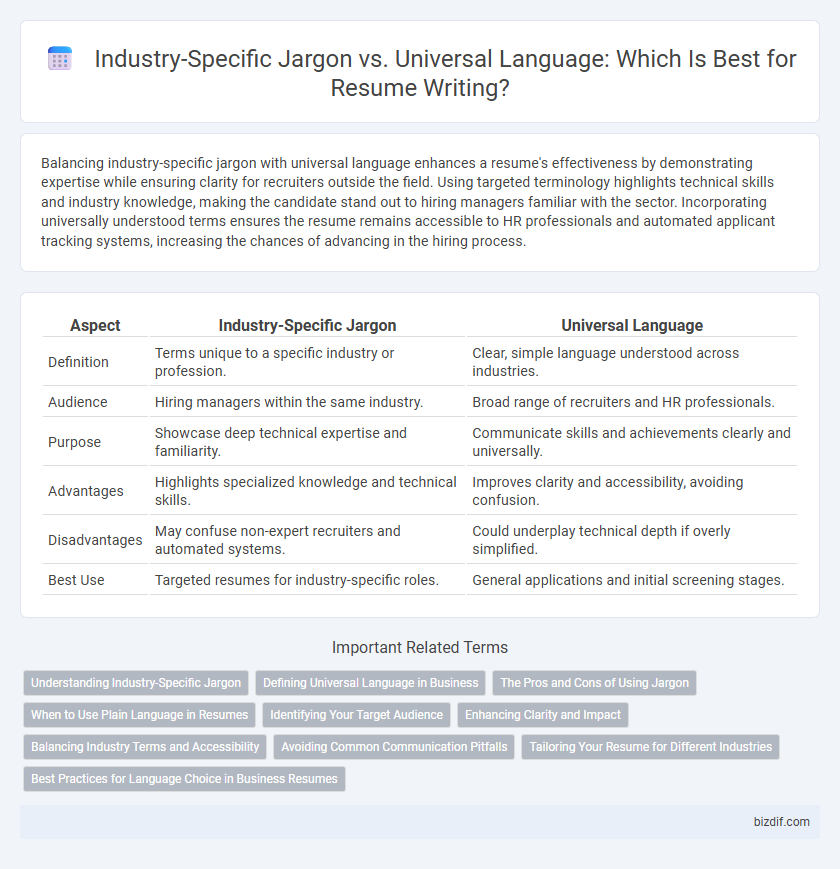Balancing industry-specific jargon with universal language enhances a resume's effectiveness by demonstrating expertise while ensuring clarity for recruiters outside the field. Using targeted terminology highlights technical skills and industry knowledge, making the candidate stand out to hiring managers familiar with the sector. Incorporating universally understood terms ensures the resume remains accessible to HR professionals and automated applicant tracking systems, increasing the chances of advancing in the hiring process.
Table of Comparison
| Aspect | Industry-Specific Jargon | Universal Language |
|---|---|---|
| Definition | Terms unique to a specific industry or profession. | Clear, simple language understood across industries. |
| Audience | Hiring managers within the same industry. | Broad range of recruiters and HR professionals. |
| Purpose | Showcase deep technical expertise and familiarity. | Communicate skills and achievements clearly and universally. |
| Advantages | Highlights specialized knowledge and technical skills. | Improves clarity and accessibility, avoiding confusion. |
| Disadvantages | May confuse non-expert recruiters and automated systems. | Could underplay technical depth if overly simplified. |
| Best Use | Targeted resumes for industry-specific roles. | General applications and initial screening stages. |
Understanding Industry-Specific Jargon
Understanding industry-specific jargon is crucial for tailoring resumes to particular fields, as it highlights relevant skills and expertise that align with job descriptions. Using precise terminology familiar to hiring managers demonstrates a candidate's proficiency and enhances credibility within the industry. Balancing jargon with clear universal language ensures the resume remains accessible to applicant tracking systems and recruiters outside the immediate sector.
Defining Universal Language in Business
Universal language in business refers to clear, concise terminology that is easily understood across diverse industries and backgrounds, minimizing the risk of misinterpretation. It emphasizes common terms, quantifiable achievements, and action-oriented verbs that resonate with recruiters regardless of their specialization. Prioritizing universal language in resume writing ensures broader accessibility and enhances the candidate's appeal in cross-functional or global job markets.
The Pros and Cons of Using Jargon
Using industry-specific jargon in resumes can demonstrate expertise and align your experience with the target field, increasing relevance to hiring managers familiar with the terminology. However, excessive jargon may confuse recruiters outside the industry or Applicant Tracking Systems (ATS) that parse resumes for standard keywords. Balancing specialized terms with universal language ensures clarity and maximizes the resume's accessibility across diverse hiring platforms.
When to Use Plain Language in Resumes
Using plain language in resumes ensures clarity and accessibility, especially when applying to companies outside one's current industry or for entry-level positions where hiring managers may lack technical expertise. Universal language highlights transferable skills and achievements, making the candidate's qualifications understandable to a broader audience. Avoiding excessive industry-specific jargon prevents confusion and increases the chances of passing through Applicant Tracking Systems (ATS) that may not recognize specialized terms.
Identifying Your Target Audience
Tailoring your resume requires identifying your target audience to decide between industry-specific jargon and universal language. Use specialized terms when applying to niche roles within your field to demonstrate expertise and familiarity. For broader or cross-industry positions, opt for clear, universally understood language to ensure accessibility and maximize impact.
Enhancing Clarity and Impact
Using industry-specific jargon in resumes demonstrates expertise and aligns your skills with targeted roles, but balancing it with universal language ensures clarity for recruiters unfamiliar with niche terminology. Clear, concise descriptions of accomplishments paired with widely understood terms increase resume accessibility and impact. Tailoring language to the job posting enhances keyword relevance while maintaining overall readability, maximizing your chances of passing applicant tracking systems and engaging human reviewers.
Balancing Industry Terms and Accessibility
Effective resume writing demands balancing industry-specific jargon with universally understood language to maximize clarity and relevance. Incorporating key technical terms aligned with the target industry enhances applicant tracking system (ATS) compatibility and demonstrates expertise. Simultaneously, using accessible language ensures hiring managers and cross-functional teams can easily comprehend qualifications and achievements.
Avoiding Common Communication Pitfalls
Using industry-specific jargon in resumes can demonstrate expertise but may confuse recruiters unfamiliar with niche terms, reducing clarity and impact. Employing universal language ensures broader comprehension and highlights transferable skills, enhancing your resume's accessibility across diverse hiring managers. Avoiding overly technical phrases and acronyms prevents miscommunication and allows key qualifications to stand out effectively.
Tailoring Your Resume for Different Industries
Tailoring your resume for different industries requires balancing industry-specific jargon with universal language to ensure clarity and relevance. Using technical terms demonstrates expertise and aligns your resume with industry expectations, while incorporating universal language broadens its appeal to recruiters unfamiliar with specialized terminology. Strategically blending both enhances your resume's effectiveness across diverse job markets.
Best Practices for Language Choice in Business Resumes
Using industry-specific jargon in a business resume demonstrates specialized knowledge and aligns with the expectations of hiring managers familiar with the field. Balancing this with universal language ensures clarity and accessibility for a broader audience, including HR professionals who may lack technical expertise. Prioritize concise, impactful terms that highlight skills and achievements while avoiding excessive acronyms or obscure terminology that could hinder comprehension.
Industry-Specific Jargon vs Universal Language Infographic

 bizdif.com
bizdif.com